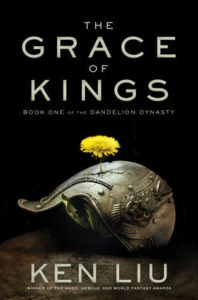
Ken Liu’s Dandelion Dynasty was often discussed among the exciting new fantasy epics back in the late 2010s when I returned to genre reading. But it’s also very long, and the first book has a reputation (arguably undeserved) for being a difficult read. So I kept putting it off, even as I read more and more of his short fiction and convinced myself I had to give his longer work a try. But at long last, library availability synced with a gap in competition reading, and I was able to dive in to The Grace of Kings.
The Grace of Kings takes place in the archipelago of Dara, uneasily united under Xana rule after seemingly endless squabbling among the seven peoples that make it up. But that uneasy peace is reaching a breaking point, with threats of rebellion outside the capital and backbiting within making it more vulnerable than it’s been in years.
And The Grace of Kings covers everything. Unlike so many other fantasy epics, the opener doesn’t zoom in on one person in one time, setting the stage for a revolution to come. It covers a revolution and more, with a story spanning decades and perspective characters from all over the map. Before reading, I’d seen many reviews that liken it to a history book, as opposed to a fantasy novel. And I’m not sure that comparison is quite right, though I would agree it reads little like a contemporary fantasy novel. Instead, I would offer a comparison to a classical epic. It may not be written in verse, but it felt more like reading The Iliad than The Wheel of Time. (Given the obvious Chinese inspiration, I wouldn’t be surprised to find a better comparison somewhere in the Eastern literary canon, but I haven’t read enough to provide one myself). The perspective is more over the shoulder than in the head, the scope is vast, and the point-of-view characters are many.
And I understand why that’s a struggle for many people. It was a struggle for me in the early going. It’s very different from my expectations as a fantasy reader, and with so many settings and so many characters, it was difficult to find a central thread to invest in. The quality of the prose is always high—although it tends toward the matter-of-fact without many extended displays of a character’s inner thoughts—but there are so many threads in the first quarter of the book that even the main characters just feel like more faces in a crowd.
But in the second quarter of the book, perspective characters start dying. And as they do, more and more perspective is focused on those who remain alive. This helps the reader get a sense of just which people and which plotlines are important, and coupled with all of the scene-setting from the first quarter, a bird’s eye picture of the conflict emerges, with the early chaos resolving into a handful of key inflection points. It takes some patience to get there, but this allows the story to have it both ways, with focus narrowing to a smaller and smaller set of key characters without losing a high-level view of an epic plot.
The characters never get quite the depth I expect in contemporary fantasy, but they do develop dimensions beyond pure archetype, and the scope of the story is staggeringly epic, with seemingly every chapter containing enough plot development to spread over hundreds of pages in other fantasy stories. At many times, it feels like a train wreck that you can’t look away from, with impulsive decisions and bad advisors drawing people into losing battles and unnecessary conflicts. But it is indeed very hard to look away, and it’s hard to say that impulsive decisions and bad advisors aren’t plenty realistic.
Overall, The Grace of Kings is a book that rewards a patient reader. The style takes some getting used to, and there are so many moving pieces that it takes a good quarter of the book to really set the scene. But when it does, the story that unfolds is a true epic, with feuds, battles, trickery, politics, you name it. And while book one does set the scene for three more in the series—which I have heard use a more contemporary style—it really stands alone quite well. For fans of epic fantasy, this is worth a read. For fans of classical epics, it’s especially worth a read.
Recommended if you like: wide-scope epics, throwback storytelling techniques, Chinese settings.
Can I use it for Bingo? It’s hard mode for Coastal Setting, and it also has a POC Author and a Title in the Title.
Overall rating: 16 of Tar Vol’s 20. Four stars on Goodreads.
